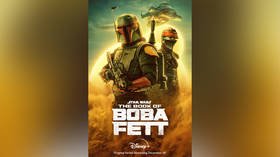‘The Book of Boba Fett’ series is bursting with potential but is off to a very slow start


This article contains minor spoilers for The Book of Boba Fett.
In the wake of the critically and commercially successful Star Wars series The Mandalorian, streaming service Disney Plus has gone back to the well with the new spin-off series, The Book of Boba Fett.
Boba Fett, the bounty hunter who famously bagged Han Solo in The Empire Strikes Back, is a character that has long been adored by Star Wars fans, and when he made his surprising return in The Mandalorian (surprising because he had seemingly died in Return of the Jedi), it was met with raucous applause from the Star Wars faithful.
Now Boba is no longer a background or supporting player, his name is on the marquee, but after watching the somewhat uneven first episode of The Book of Boba Fett, it’s too soon to tell if the infamous bounty hunter has the star power to hold audiences’ attention over the course of a seven-episode series.
The Book of Boba Fett, which stars Temuera Morrison as Fett and Ming-Na Wen as Fennec Shand, a mercenary and assassin, premiered on December 28 and will release a new episode for the next six Wednesdays, for a total of seven in all.
The opening episode, written by Jon Favreau (director of Iron Man and creator of The Mandalorian) and directed by Robert Rodriguez, is titled ‘Stranger in a Strange Land,’ and uses flashbacks to show some of Boba Fett’s strange journey after he went into the Sarlacc’s mouth on Tattooine in Return of the Jedi, up to the present day, where he is a crime boss sitting on Jabba the Hutt’s old throne.
Fett’s history deeply informs his present, and so the flashbacks make complete narrative sense but, that said, they also slow down the pace of the program, leaving it at times on the precipice of tedium.
Also hampering the show, at least thus far, are some pretty sub-par action sequences. One fight with Boba Fett and Fennec Shand against a group of anonymous ninja assassins on the streets of Mos Espa, is very poorly choreographed and shot, so much so that it looks amateurish.
Although, in contrast, there is a solid sand battle between Boba Fett and a very cool-looking sand beast in one of the many flashbacks. Hopefully this sequence, and not the predictable and dull fight in Mos Espa, is a preview of the type of action we can expect in the coming episodes.
The visuals of the show also leave something to be desired, as the cinematography of the first episode is painfully rudimentary, and lacks imagination or cinematic flair.
As for the cast, again, thus far it could go either way. Morrison is not a particularly compelling screen presence, and neither is Ming-Na Wen, but there’s always the possibility that they find their sea legs and grow into their characters as the series continues.
As the show moves forward, there are some potentially intriguing storylines. For example, the mayor of Mos Espa refuses to pay tribute to Boba, and his representative even delivers an ominous threat to the crime boss, something which should lead to some fireworks down the road.
Another somewhat intriguing angle in the story is that, while Boba Fett is obviously no shrinking violet as a crime lord, he also doesn’t want to be an arrogant and brutal tyrant like Jabba the Hutt.
For instance, Boba demands he walk around “on his own two feet” as he patrols the city of Mos Espa, because, unlike Jabba, he won’t be “carried around like a useless noble.” He follows that up with, “Jabba ruled with fear. I intend to rule with respect.”
Fett is no Jabba, he’s a working man’s crime boss. And he isn’t the cold-blooded bounty hunter of the past, either; he is more forgiving. For example, he pardons two of Jabba’s bodyguards because they were loyal and, by sparing their lives, they become loyal to him.
That said, Boba Fett still has the killer instinct when he needs to, like when he gloriously obliterates one of the ninja assassins who ambush him on the streets of Mos Espa in the best shot of the show so far.
This conflict within Boba Fett, and between Boba Fett and the world, has a great deal of dramatic and narrative promise, but the first episode leaves me uncertain as to whether this promise can ever be fulfilled.
I felt the same way about The Mandalorian at first, too. And the reason I am so cautious in my criticism of The Book of Boba Fett is because The Mandalorian got better and better with each episode and I ended up absolutely loving the series, even though I’m not much of a Star Wars aficionado.
Ultimately, after just one episode The Book of Boba Fett is too much of a mixed-bag and too uneven to make any judgements on whether the overall series will be worthwhile or not. Hopefully, this flawed series opener is the bottom and everything goes up from here.